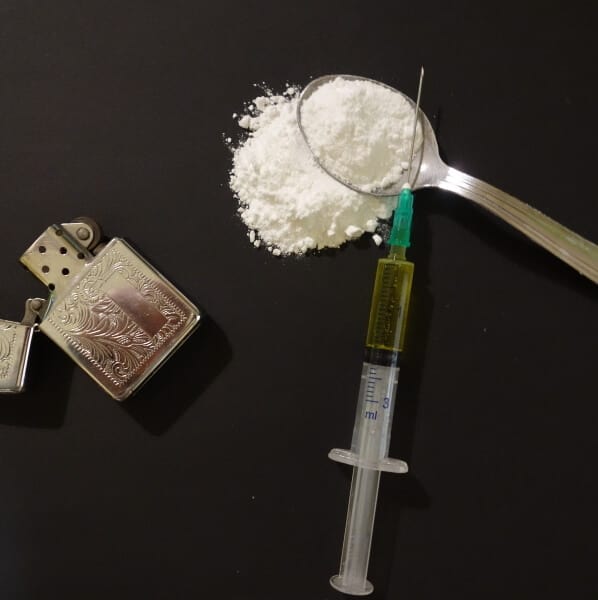Heroin addiction and old age rarely co-exist
At The Haynes Clinic we get people of all ages admitted for an alcohol addiction (even 80 years old and more). However old age users of heroin rarely exist as the drug totally ravages their bodies and they don’t reach a mature age. The high mortality statistics for heroin users are generally split between an overdose, chronic liver disease and general accidents.

Heroin is cheap and versatile
Part of the problem and one of the main reasons that heroin is a popular choice of drug addicts is its cost. It is possibly the cheapest drug on the street, and it can be injected or snorted or smoked. Sadly, it is usually the case that when someone starts to inject heroin they are shown how and even have the drug injected into them by another person to show them how to do it.
Taking any heroin is very risky
Heroin is a powerful opiate which is highly addictive and when sold by a dealer it will have been “cut” with all sorts of different substances. It will range in colour from a brownish white to brown. Common substances used as cutting agents that reduce the level of purity of the drug include rat poison, powdered milk, crushed over the counter pain killers, starch, baking soda, talcum powder and caffeine. Therefore, one of the dangers is that no two batches are the same as they will have been mixed with differing amounts of different ingredients.
Secondly, some of the cutting agents do not fully dissolve in the injection solution and can lead to serious health problems as the particles build up or block arteries. This can lead to an early heart attack or other heart conditions, including infection of the heart tissues, blockages in the brain and liver damage.
It is easy to overdose on heroin
One of the main contributors to an overdose is when heroin has been cut with another drug called Fentanyl. This is a prescription opioid that is 100 times more powerful than morphine. The strength of the combined drugs when injected lead to an overdose: basically, the body cannot cope with the sudden increase of strength of the dose that it would normally be used to, and people die as a consequence.
There is only one way to temporarily reverse an overdose and that is to inject naloxone which can also come in the form of a nasal spray. The majority of overdoses – about 80% – occur within the person’s living / home environment and in nearly 50% of all overdose deaths someone else was present. So having naloxone available allows another person to be able to help until the emergency services arrive.
Heroin’s place in the opiate family
Opiates are a family of drugs that include natural, synthetic and semi synthetic opioids. Morphine and codeine are natural opioids found in the opium poppy. Synthetic opioids such as methadone are chemically made. Heroin is a semi synthetic opioid which is made from morphine that has been chemically processed. Most heroin is produced in Asia and Latin America where opium poppies are grown. Morphine is extracted from the opium gum in laboratories and converted into heroin.

Help for heroin addicts
Heroin users can get help – if they want it – from the local drug and alcohol team. Arguably there is more help in the community for a heroin drug addict than for alcohol addict. For anyone wanting to come off heroin there are two separate approaches.
Firstly, to go into an addiction rehab clinic or drug treatment centre such as The Haynes Clinic, on a residential basis: here part of the treatment would be to have a heroin detox, often using the drug Subutex / buprenorphine on a daily reducing scale which would usually result in someone being completely detoxed off the drug within two weeks.
Secondly, there is maintenance therapy – usually provided in the community – where you switch from heroin to methadone, which is a heroin substitute and then you stay on a stabilising dose long term and slowly try and reduce down. Methadone is a green liquid which you take once a day and it is, as previously mentioned, a synthetic opioid. The methadone is prescribed by a prescribing nurse within the drug and alcohol team. It reduces the withdrawal symptoms, such as shivering, shaking, stomach cramps and also helps to stop cravings.
The problem can be that to find the correct maintenance dose people are firstly started on a low dose, before it is increased, and they will feel the effects of withdrawal and can then dangerously use heroin on top of the methadone.
The risk of overdose following a heroin detox
It is a fact that it is dangerous for an alcoholic to suddenly stop drinking but it isn’t dangerous for a heroin user to suddenly stop taking heroin. An alcoholic can suffer dangerous, potentially fatal, fits or seizures whereas a heroin user will suffer severe withdrawal but without the risk of them being fatal. Conversely, if an alcoholic has a relapse and starts drinking again then they will drink large quantities often very quickly but usually without fatality. With a heroin user, if they relapse, the first injection can lead to a fatal overdose. This is the reason why prisoners, who were known to be heroin users, are given naloxone to carry with them when they leave the prison environment, in case they relapse.
Heroin’s impact on the brain
Repeated heroin use changes the physical structure and physiology of the brain which creates long term imbalances in these brain systems that may never be reversed. Clinical studies have clearly shown the deterioration of the brain’s white matter due to heroin use which in turn affects our decision making and stops our ability to regulate our behaviour in a normal way. Heroin also quickly produces high levels of tolerance so that we need more of the drug to get a similar effect. A physical dependence will mean that we will also need to use more often as withdrawal symptoms will start sooner.
Heroin addiction increases the risk of contracting blood borne viruses
There is a further risk of contracting various blood born viruses such as HIV and hepatitis or blood poisoning from sharing needles. The local drug and alcohol team will arrange a needle exchange and the ability to get free bottles of fresh water to try and combat this.
Help for heroin addiction
Like all addictions, heroin addiction is all about “loss”, but it is different in the way that it imposes so many more health risks and dangers. However, as with all addictions, there is a way forward and there is always hope that someone will take that first step to get clean from the drug.
